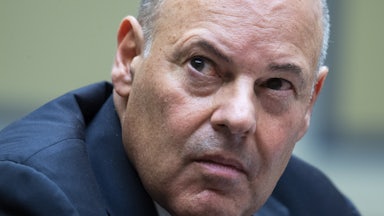One of the long-running jokes of the Trump era was the notion that its bizarre twists and turns unfolded as though they’d been scripted by a troupe of hack screenwriters, laughing and typing away above, somewhere in the heavens. On Saturday, they gave us what might have been a series finale, although we can’t really be sure—gritty and unexpected revivals are in vogue, after all. For most of the country, it was a disappointing finish. Nearly 60 percent of Americans believe Trump should have been convicted, and ordinary voters who believed he actually would be can’t really be blamed: Fictional narratives with villains as cartoonish as Trump tend to come to tidy and even didactic endings. But reality is another thing entirely. History is a great muddle; every moment dissolves hazily into the next. And the 2020 election itself was less a thumping defeat for Trump and his party than an anxious slide deeper into our national fever. Both the Capitol riot and Trump’s acquittal are symptoms of an illness that isn’t letting up.
What’s caused it? One answer is the power of the Republican Party. After weeks of high dudgeon from most corners of the media and a corporate backlash, Trump’s incitement of an attack on Congress that led to five deaths yielded a grand total of seven Republican votes in the Senate for his conviction. Ten more were needed; despite broad public support for conviction, winning them was never actually in the cards. The Republican Party is simply not answerable to public opinion. This argument has been made repeatedly here and elsewhere for years at this point. And at long last, some of the major organs of the mainstream press seem to be joining in.
Take The New York Times’ David Leonhardt, who wrote on Monday, in a jewel of Timesian understatement for the paper’s main daily news brief, that the GOP’s structural advantages have given it “ways other than majority support to achieve its goals.” “The party has had a pretty good few decades, policy-wise,” he explained. “Republican-appointed justices dominate the Supreme Court. Republicans are optimistic they can retake control of both the House and the Senate next year (even if they win fewer votes nationwide). Taxes on the wealthy are near their lowest level in a century. Democrats have failed to enact many of their biggest priorities—on climate change, Medicare, the minimum wage, preschool, gun control, immigration, and more. Yes, Trump’s acquittal bucks public opinion. But it still might not cost the Republicans political power.” As true as all this is, the party’s leaders still try to cobble together pro forma excuses for their outrages. On Saturday, Senate Minority Leader Mitch McConnell defended Trump’s acquittal with the argument that the trial, which he had delayed until Trump’s departure, had been unconstitutional now that Trump is a private citizen. So it goes.
The right’s power has been bolstered by the fecklessness of the Democratic Party. Like the above, this has been said enough times that it can’t really be expounded upon at length in a novel or interesting way. But here, too, the straight political press has taken notice. In a Saturday piece, The Washington Post’s Aaron Blake expressed the bafflement of many over the party’s support for, and sudden reversal on, admitting witnesses to the trial. “They said this was vitally important,” he wrote. “They said this was the worst offense a U.S. president had ever committed. They said accountability was required. Even if Republicans would never have provided enough votes, there is still value in putting all of this on the record—and maybe even, however unlikely, forcing those Republicans to confront the evidence the Democrats said was incontrovertible. Democrats passed on even really trying.” Ultimately, they passed because they weren’t sure why the trial was happening in the first place. The indecision and flip-flop on witnesses proved it.
As was the case the first time around, the strongest rationale for impeachment was that it might have offered Democrats an opportunity to present a clear indictment of the Republican Party as a whole to the electorate. It’s long been clear that they’ll never do this. And that’s partially because most Democratic voters don’t want them to. A CBS poll this month found that 59 percent of Democrats view the GOP as ordinary political opponents while 41 percent view them as enemies. Those numbers are reversed among Republicans: 57 percent view Democrats as enemies, while 43 percent view them as opponents. All of this is reflected perfectly in the temperament of each party. The American political system might be riddled with anti-democratic inequities, but both sides of the political divide have been given exactly the kind of partisan leaders they want. In a press conference with the House’s impeachment managers on Saturday, Speaker Nancy Pelosi reiterated for the umpteenth time that she believes the country “needs a strong Republican Party.” Fortunately for her and the majority of Democratic voters who agree, we have one.








